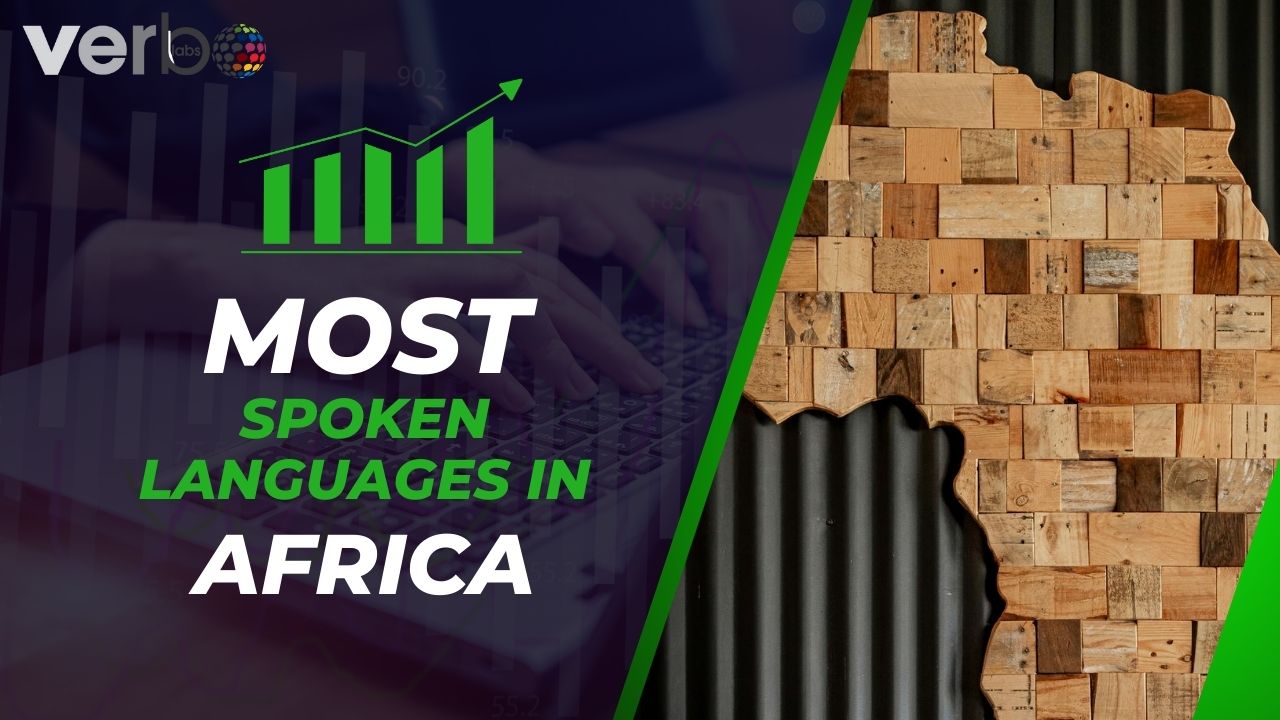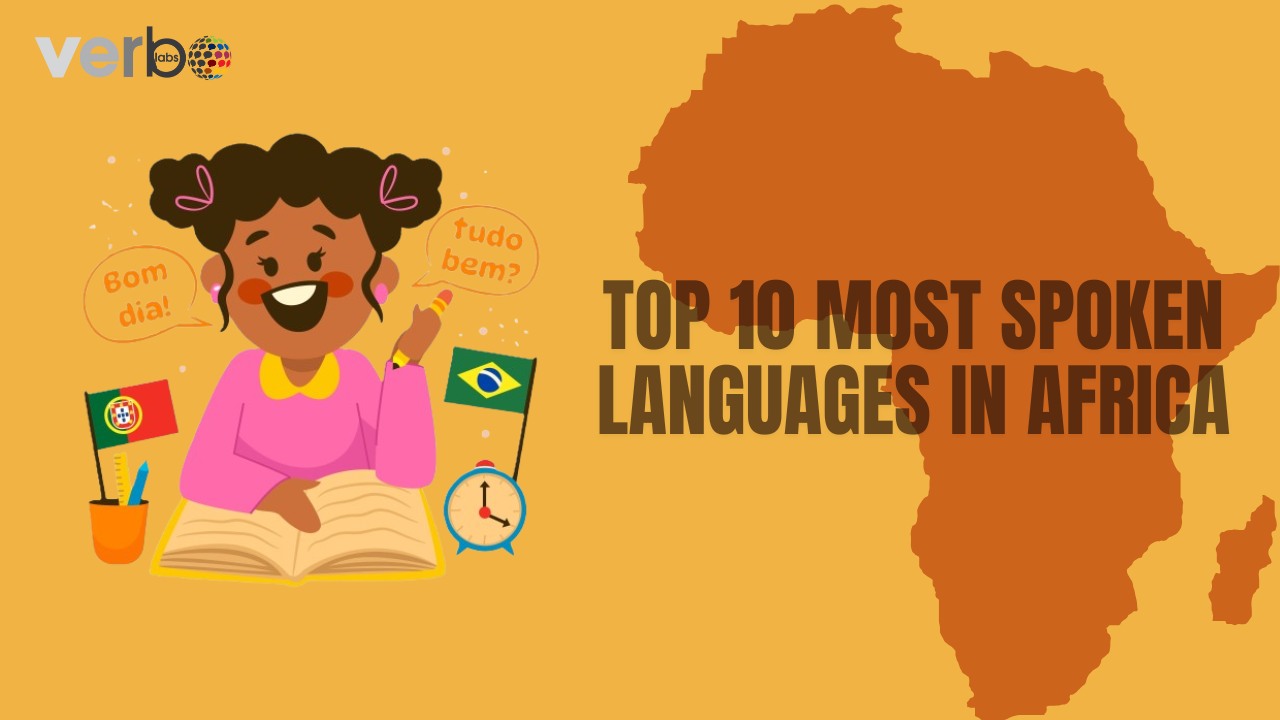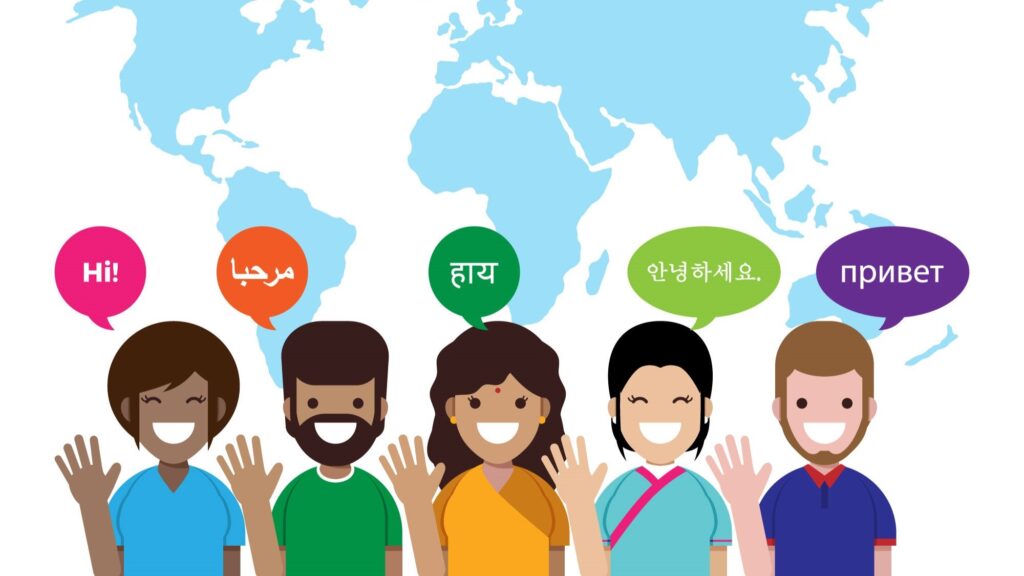
Africa is home to one of the richest linguistic landscapes on Earth. With over 2,000 different languages spoken in Africa, the continent accounts for nearly one-third of all languages worldwide. This linguistic diversity mirrors Africa’s deep cultural history, dynamic societies, and centuries of human migration and interaction.
Whether you’re a global business expanding into African markets or simply curious about the languages spoken in Africa, understanding this diversity is key to authentic communication and cultural respect.
From Swahili and Arabic to Zulu and Amharic, the major languages spoken in Africa shape identities, education systems, and even economies. This is where professional language solutions become invaluable. Services like AI dubbing, transcription, and desktop publishing, when coupled with expert human translation, enable organizations to connect authentically with multilingual African audiences. Verbolabs specializes in these comprehensive language solutions, helping bridge communication gaps across the continent’s most influential languages.
Overview of Africa’s Linguistic Landscape
The languages in Africa belong to four main language families:
| Language Family | Example Languages | Regions Found |
| Niger-Congo | Swahili, Yoruba, Igbo, Zulu | West, Central, Southern Africa |
| Afroasiatic | Arabic, Amharic, Somali, Hausa | North and Northeast Africa |
| Nilo-Saharan | Luo, Maasai, Kanuri | East and Central Africa |
| Khoisan | Nama, !Kung | Southern Africa |
In addition, European languages like English, French, and Portuguese—legacies of colonization—serve as official languages in many countries.
This diversity stems from millennia of migration, trade, conquest, and cultural exchange. Ancient kingdoms like Mali, Ghana, and Great Zimbabwe fostered linguistic development, while colonial boundaries later divided linguistic communities and elevated European languages to official status in many regions.
Today, most Africans are multilingual by necessity, often speaking a local language, a regional lingua franca, and an official national language. This multilingualism creates both challenges and opportunities in our globalized economy, where effective communication across language barriers can open doors to untapped markets, educational advancement, and cultural exchange.
How Many Different Languages Are Spoken in Africa?
Africa hosts over 2,000 indigenous languages and countless dialects. In some countries, dozens of languages coexist — for instance:
- Nigeria: Over 500 languages
- Democratic Republic of Congo: Around 215
- South Africa: 11 official languages
This makes Africa the most linguistically diverse continent in the world.
Top 10 Most Spoken Languages in Africa

1. Swahili
Spoken by over 100 million people, Swahili dominates East Africa. It’s an official language in Kenya, Tanzania, Uganda, and the Democratic Republic of Congo, and serves as a lingua franca across much of the continent.
Businesses entering these markets often localize into Swahili to reach broader audiences.
Originally a coastal trade language with Arabic influences, Swahili has evolved into a crucial medium for business, education, and media across East Africa. Its standardized form facilitates regional integration and commerce.
For organizations entering East African markets, Swahili localization offers access to a vast, economically dynamic region. Translation services that capture Swahili’s nuances can significantly enhance market penetration and consumer trust.
2. Arabic
With around 170 million speakers, Arabic is one of the most widely spoken languages in Africa, primarily in North Africa—Egypt, Morocco, Algeria, Libya, Sudan, and Tunisia.
It’s deeply tied to religion, trade, and education, and connects Africa to the wider Arabic-speaking world.
Arabic’s importance extends beyond daily communication into religion, diplomacy, education, and commerce. It connects North Africa to the broader Arabic-speaking world, facilitating trade across the Mediterranean and the rMiddle East.
Professional translation services with dialect expertise ensure communications resonate authentically with target audiences.
3. Hausa
Hausa is spoken by roughly 80 million people in West Africa, especially in Nigeria, Niger, Cameroon, and Ghana. As a commercial and media language, Hausa is essential for communication across the Sahel.
With a substantial presence in media, literature, and online content, Hausa offers businesses a gateway to West African markets. The language’s extensive use in radio broadcasting makes it particularly valuable for reaching rural populations.
4. Amharic
The official language of Ethiopia, Amharic, has over 30 million native speakers.
Its unique Ge’ez script and cultural heritage make it one of the most distinct African spoken languages.
Today, Amharic is essential for business, government, and education in Africa’s second-most populous country. Ethiopia’s rapidly growing economy makes it an increasingly important market, where Amharic proficiency or translation services are vital for success.
5. Yoruba
Spoken by around 45 million people in Nigeria, Benin, and Togo, Yoruba plays a crucial role in West African culture and commerce.
It’s also influential globally through music and diaspora communities. Nigeria’s Yoruba-speaking regions include Lagos, Africa’s largest city and a major economic hub. This makes Yoruba translation increasingly valuable for entertainment, technology, and consumer products.
6. Igbo
With 30 million speakers, Igbo is another major language spoken in Africa, especially in southeastern Nigeria.
It’s vital for digital marketing, education, and cultural preservation across Africa’s most populous nation.
The Igbo-speaking region is known for entrepreneurship and commerce, making it an attractive market for business expansion. Digital content in Igbo is growing rapidly, creating opportunities for localized marketing, educational materials, and media.
7. French
Over 140 million Africans speak French, making it one of the top languages spoken in Africa by country count.
It’s an official language in 21 nations, including Senegal, Cameroon, and Côte d’Ivoire.
French functions as a unifying language for education, government, and international business across these diverse regions. It also facilitates participation in the global Francophone community, creating cultural and economic connections beyond Africa.
While European French provides a foundation, professional language services must account for African French variations, which incorporate local vocabulary and expressions that reflect distinct cultural contexts.
8. English
Spoken by 130 million people, English dominates in Nigeria, South Africa, Ghana, Kenya, and Zimbabwe.
It’s a key language for education, technology, and international business across the continent. As the global language of business and technology, English proficiency creates opportunities for African professionals and businesses in the international marketplace. However, African English varieties contain unique expressions and usages that reflect local cultures.
Organizations must balance standard international English with sensitivity to local varieties when communicating across Anglophone Africa, often requiring expertise in regional expressions and cultural references.
9. Zulu
Zulu is the most spoken language in South Africa, with over 12 million native speakers.
It’s one of 11 official languages in South Africa, reflecting the nation’s inclusive linguistic policy.
Zulu’s cultural significance extends beyond South Africa through traditional music, dance, and philosophy. Its presence in media and entertainment continues to grow, creating opportunities for localized content.
South Africa’s position as the continent’s most developed economy makes Zulu localization valuable for businesses targeting this diverse market, particularly in KwaZulu-Natal province and beyond.
If you’re wondering what languages are spoken in South Africa, the main ones include:
- Northern Sotho
- Zulu
- Xhosa
- Afrikaans
- English
- Sesotho
- Tswana
- Venda
- Tsonga
- Ndebele
- Swati
10. Oromo
With 35 million speakers, Oromo is Ethiopia’s most widely spoken indigenous language after Amharic.
It’s growing rapidly in education and media, especially in the Oromia region.
Oromo speakers represent a significant consumer market within Ethiopia’s growing economy. Recent political reforms have elevated the Oromo’s status, creating new opportunities for media, education, and business communications in the language.
As Ethiopia continues to liberalize its economy, professional Oromo translation services will become increasingly valuable for organizations seeking to engage with this substantial population segment.
Also Read:
- Most Spoken Languages in the USA: A Linguistic Snapshot
- Most Spoken Languages in India: A Comprehensive Guide for Businesses
- The Most Spoken Languages in the World: A Global Overview
Languages Spoken in Africa by Country
| Country | Official / Major Languages |
| Nigeria | English, Hausa, Yoruba, Igbo |
| South Africa | Zulu, Xhosa, Afrikaans, English, and others |
| Egypt | Arabic |
| Kenya | Swahili, English |
| Ethiopia | Amharic, Oromo, Somali |
| Democratic Republic of Congo | French, Swahili, Lingala, Kikongo |
| Ghana | English, Akan, Ewe |
| Morocco | Arabic, Berber (Amazigh) |
| Tanzania | Swahili, English |
| Senegal | French, Wolof |
Impact of These Languages on Business and Global Communication

Africa’s linguistic diversity is a double-edged sword: a challenge for communication but a massive opportunity for localization.
Brands that adapt content to local languages spoken in Africa build stronger trust and engagement.
AI and Translation in African Languages
Modern translation services now use AI-powered dubbing, speech recognition, and machine translation tools—enhanced by human expertise—to ensure accuracy and cultural nuance.
Verbolabs leads in this space, offering translation, transcription, and dubbing for the major African languages like Swahili, Yoruba, Arabic, and Zulu. Our successful partnerships include helping a global e-learning provider localize educational content into Swahili, Arabic, and French for distribution across 12 African countries, and supporting a healthcare NGO with Hausa and Yoruba translations for public health campaigns that reached millions.
How Verbolabs Supports Multilingual Growth in Africa
- Native translators ensure accuracy and cultural sensitivity.
- AI-assisted translation improves efficiency.
- Multilingual DTP (Desktop Publishing) maintains layout integrity across different scripts.
- Case study: Verbolabs helped a global e-learning company localize courses into Swahili, French, and Arabic, reaching millions of new learners.
For more information, visit Verbolabs Language Solutions.
Conclusion
The languages spoken in Africa are not just tools of communication—they’re keys to unlocking business growth, education, and cross-cultural understanding.
By investing in localization and translation services across Africa’s most common languages, organizations can connect meaningfully with one of the fastest-growing regions on Earth.
From Swahili in East Africa to Zulu in South Africa, Africa’s voices are as diverse as they are powerful — and understanding them is the first step toward lasting success.
Ready to enhance your communication across Africa’s most influential languages? Contact Verbolabs today to discover how our expert language solutions can help you connect more effectively with multilingual African audiences.

Ready to enhance your communication across Africa’s most influential languages? Contact Verbolabs today to discover how our expert language solutions can help you connect more effectively with multilingual African audiences.
FAQs
Over 2,000 languages are spoken across Africa, representing about one-third of the world’s total languages.
Swahili, Arabic, Hausa, Amharic, Yoruba, Igbo, French, English, Zulu, and Oromo.
South Africa recognizes 11 official languages, including Zulu, Xhosa, Afrikaans, and English.
Africa’s vast history of migration, trade, and cultural evolution led to the formation of numerous ethnic groups and languages.
Swahili, French, English, and Arabic are the most practical for cross-border business and trade.
Africa is home to over 2,000 languages, but the most widely spoken include Arabic, Swahili, Hausa, Amharic, and Zulu. Arabic dominates North Africa, while Swahili connects East African nations. English, French, and Portuguese serve as official languages in many countries. Among them, Swahili and Arabic are often considered the main languages spoken across Africa due to their vast number of native and second-language speakers.
Africa’s four major language groups are:
Afro-Asiatic Languages – Spoken in North Africa and the Horn of Africa (e.g., Arabic, Amharic, Somali).
Niger-Congo Languages – The largest group, covering West, Central, and Southern Africa (e.g., Swahili, Yoruba, Zulu).
Nilo-Saharan Languages – Found mainly in Central and Eastern Africa (e.g., Maasai, Luo, Kanuri).
Khoisan Languages – Spoken in parts of Southern Africa, known for distinctive click sounds.



